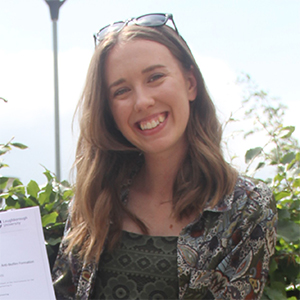Amy Morgan
- Subject area
- Materials
This summer, I undertook a 10-week summer internship in the School of Aeronautical, Automotive, Chemical and Materials Engineering in the field of polymer chemistry, looking into Polymer nanoparticles for anti-biofilm surfaces.
After enjoying my dissertation lab work, I wanted some experience of research to decide whether I'd enjoy a PhD after graduating.
I was working hands-on in the polymer labs in S Building. My project had three main aims: to fabricate nanoparticles, functionalise the nanoparticle surfaces with an anti-biofilm agent, and form films by drop casting onto a surface.
Dr Fiona Hatton was my project supervisor for the summer. Fiona was also my dissertation supervisor, so it was nice to see a familiar face when I started the internship. There were a few other PhD students in the office/labs that could help when I got stuck, for example running instruments or analysing data. I was lucky enough to have another summer student working on a very similar project to me so we could bounce ideas off each other and keep one another inspired.
I arrived at 9am and set up my laptop in the office. The morning consisted of preparing samples and running GPC/NMR/DLS analysis. At 11am, I often had coffee and cake with other students/PhD students. After lunch, I would put on the polymerisation reactions that would take overnight to complete. Once lab work was finished, I would sit at my desk in the office and analyse data e.g., make graphs, write up reports. Home time was about 3:30-4pm each day.

I've gained so much confidence in lab techniques like polymerisation reactions and film forming. I have learnt skills in time-management and teamwork, because there was a lot of exciting experimentation to undertake in the short 10 weeks, with others using the lab too. The summer project has really strengthened my CV, giving me more relevant experience in materials engineering, alongside my industrial placement. It's helped prove I can successfully work in both industry and academic research roles.
I have been persuaded to pursue a career in research and I am going to look into PhD study after I graduate.
I would recommend doing a summer internship! You get to be part of novel research, discovering things that no one has before. There are plenty of diverse project areas to suit everyone's niche, whether polymer chemistry, metallurgy, ceramics or composites, etc. Even though you're seemingly giving up 10 weeks of your summer, it's a fun, confidence-building experience with the perk of being paid to research.
Biomaterials Engineering was the perfect blend of chemistry, biology and product design, which were my A level subjects. I loved the multi-disciplinary modules Loughborough offered and was excited to apply materials engineering to healthcare and sustainability applications in particular.
I aspire to do a PhD and then head into the healthcare industry to apply my research to real life applications. I'd like to improve people's health and quality of life through materials engineering. The multi-disciplinary style of Biomaterials Engineering at Loughborough has gently guided me to find my own area of interest and given me the diverse skillset to be employable in that sector.
The community on campus is so welcoming and after 4 years of studying, feels like home to me. I have been involved in the Christian Union during my time at Loughborough and really enjoy the music scene on campus and in town. I am also a student ambassador: I get the chance to chat about how much I love Loughborough and my course and get the opportunity to welcome new/potential students onto campus. I liked the community vibe of a campus university and liked that Loughborough itself is a town alike to my hometown. It is a prestigious university, not only for sport but also engineering.
There is so much to get involved in! A whole world of different sports, art and culture societies. There are always new people and experiences.